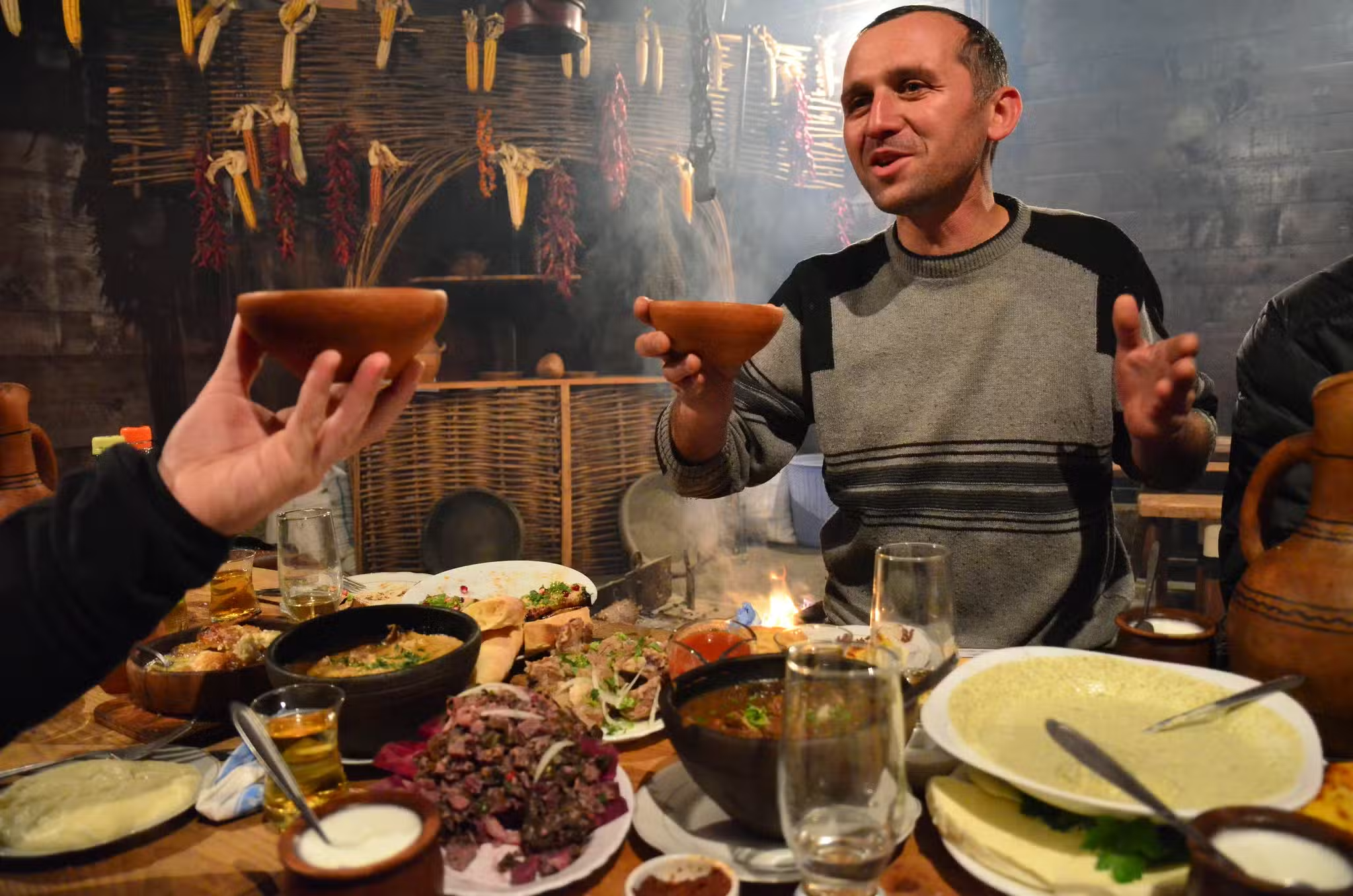The Talking Phrasebook Series presents useful phrases and words in side-by-side translation and with audio files specifically geared to help students work on listening skills and pronunciation. Each entry below, divided by category, features an English word or phrase in the left column and its Georgian translation in the right. The Georgian is presented in the Georgian alphabet on top and in English transliteration below that.
In the center column for each row is a play button. The recorded file will feature first English, then the Georgian in three versions: one slow, one with each syllable broken out, and a last version that will be spoken as it might be overheard in a conversation between native speakers.
Interesting Facts about Georgian
- Georgian, along with Svan, Mingrelian, and Laz, forms the Kartvelian language family, a relatively isolated group with no proven relationship to any other language family in the world.
- Georgian does not use capital letters.
- Georgian has no gender. Even pronouns are all gender neutral. Perhaps for this reason, Tamar, one of Georgia’s greatest and most beloved historical leaders, is often referred to as “King Tamar,” despite having been female. When she assumed the throne, it was determined that although the title “King” usually went to a male leader, its most important meaning was “highest sovereign leader,” and thus would be applied to Tamar.
- Stress in Georgian is very weak. Some argue whether it exists at all and those that believe it does will often argue about where it occurs in specific words.
- Georgian verbs and nouns can be extensively modified with suffixes and prefixes to give more information, which can result in long, but rich words. Verbs will tell you, for instance, who performed the action, if the action was completed, etc. Nouns can also be modified. For instance, the Georgian 12th century epic, The Knight in the Panther’s Skin, is conveyed with just one word: ვეფხისტყაოსანი (pronounced: Vepkhistkaosani).
- Because of this, Georgian is a pro-drop language, meaning that pronouns and nouns are often missing from the text because they are unnecessary to understand its meaning.
- Georgian has seven noun cases: nominative, ergative, dative, genitive, instrumental, adverbial, and vocative.
- Although most agree that Georgia’s unique alphabet was modeled off of Greek, there is no full agreement on who created it or when. A version of it has been in use in Georgia since at least the 5th century.
- Standard Georgian has changed relatively little over the last 1000 years and can still be largely understood by educated Georgians. Most other languages change greatly over such a large time frame. English, for instance, is unrecognizable.
- Somewhat like Hebrew, Georgian assigns each letter with a numerical value. These run from one to 10,000, meaning that Georgian letters can be used for counting and lend themselves well to writing in code.
The Georgian Alphabet
| Letters | Name of Letter | Transliteration (approx.) |
| ა | an | a |
| ბ | ban | b |
| გ | gan | g |
| დ | don | d |
| ე | en | e |
| ვ | vin | v |
| ზ | zen | z |
| თ | tan | t |
| ი | in | i |
| კ | k’an | k’ |
| ლ | las | l |
| მ | man | m |
| ნ | nar | n |
| ო | on | o |
| პ | p’ar | p’ |
| ჟ | zhan | zh |
| რ | rae | r |
| ს | san | s |
| ტ | t’ar | t’ |
| უ | un | u |
| ფ | par | p |
| ქ | kan | k |
| ღ | ghan | gh |
| ყ | q’ar | q’ |
| შ | shin | sh |
| ჩ | chin | ch |
| ც | stan | ts |
| ძ | dzil | dz |
| წ | ts’il | ts’ |
| ჭ | ch’ar | ch’ |
| ხ | xan | x |
| ჯ | jan | j |
| ჰ | hae | h |
Survival Basics for Georgian
| Hello! | გამარჯობა!
(gamarjoba!) |
|
| Yes | კი
(ki) |
|
| No | არა
(ara) |
|
| Good morning! | დილა მშვიდობის!
(dila mshvidobis!) |
|
| Good evening! | საღამო მშვიდობის!
(saghamo mshvidobis!) |
|
| What’s up? | რა ხდება?
(ra khdeba?) |
|
| How are you? | როგორ ხარ?
(rogor khar?) |
|
| Good, thanks, and you? | კარგად, მადლობა. და შენ?
(kargad, madloba. da shen?) |
|
| Very well, thanks! | ძალიან კარგად. მადლობა!
(dzalian kargad, madloba!) |
|
| Goodbye! | ნახვამდის!
(nakhvamdis!) |
|
| See you later! | მოგვიანებით გნახავ!
(mogvianebit gnakhav) |
|
| See you soon! | დროებით!
(droebit) |
|
| Sorry! | ბოდიში!
(bodishi!) |
|
| Open | ღიაა
(ghiaa) |
|
| Closed | დაკეტილია
(daket’ilia) |
|
| Pull | მოქაჩე
(moqache) |
|
| Push | მიაწექი
(miats’eqi) |
|
| Small | პატარა
(pat’ara) |
|
| Big | დიდი
(didi) |
|
| Do you speak English? | ინგლისურად საუბრობთ?
(inglisurad saubrobt?) |
|
| I don’t speak English. | არ ვსაუბრობ ინგლისურად.
(ar vsaubrob inglisurad.) |
|
| I only speak a little Georgian. | მხოლოდ ცოტა ქართული ვიცი.
(mkholod tsot’a qartuli vitsi.) |
|
| I see | გასაგებია.
(gasagebia.) |
|
| I understand. | გავიგე.
(gavige.) |
|
| I didn’t get it. | ვერ მივხვდი.
(ver mivkhvdi.) |
|
| I don’t understand. | ვერ გავიგე.
(ver gavige.) |
|
| Thank you! | მადლობა!
(madloba!) |
|
| Thank you very much! | დიდი მადლობა!
(didi madloba!) |
|
| You’re welcome! | არაფრის!
(araphris!) |
|
| Good | კარგი
(kargi) |
|
| Bad | ცუდი
(tsudi) |
|
| Please | გეთაყვა
(getaqkhva) |
|
| Please give me a call. | დამირეკე თუ შეიძლება.
(damireke tu sheidzleba.) |
|
| Welcome! | მობრძანდით!
(mobrdzandit!) |
|
| Excuse me! | უკაცრავად!
(ukatsravad!) |
|
| I am sorry! | ბოდიში!
(bodishi!) |
|
| Forgive me! | მაპატიე!
(mapat’ie!) |
|
| A little | ცოტა
(tsot’a) |
|
| Could you speak more slowly? | შეგიძლიათ ცოტა ნელა ისაუბროთ?
(shegidzliat tsot’a nela isaubrot?) |
|
| Could you write that down? | შეგიძლიათ დამიწეროთ?
(shegidzliat damits’erot?) |
|
| My bag/wallet/passport was stolen. | ჩემი ჩანთა/საფულე/პასპორტი მომპარეს.
(chemi chanta/saphule/pasport’i mompares.) |
|
| I need a doctor! | ექიმი მჭირდება!
(eqimi mtchirdeba!) |
|
| Call the police! | პოლიციას დაურეკეთ! (politsias daureket!) |
Introductions in Georgian
| What is your name? | რა გქვიათ?
(ra gqviat?) |
|
| Pleased to meet you! | მესიამოვნა თქვენი გაცნობა!
(mesiamovna tqveni gatsnoba!) |
|
| I am 25 years old. | ოცდახუთი წლის ვარ.
(otsdakhuti ts’lis var.) |
|
| How old are you? | რამდენი წლის ხართ?
(ramdeni ts’lis khart?) |
|
| Where are you from? | საიდან ხართ წარმოშობით?
(saidan khart ts’armoshobit?) |
|
| I am American. | ამერიკელი ვარ.
(amerikeli var.) |
|
| No, I am from Canada. | არა, კანადიდან ვარ.
(ara, kanadidan var.) |
|
| She is Australian. | ის ავსტრალიელია.
(is avst’ralielia.) |
|
| He is Georgian. | ის ქართველია.
(is qartvelia.) |
|
| We are from New Zealand. | ჩვენ ახალი ზელანდიიდან ვართ.
(chven akhali zelandiidan vart.) |
|
| They are from Armenia. | ისინი სომხეთიდან არიან.
(isini somkhetidan arian.) |
|
| How do you like Georgia? | როგორ მოგწონთ საქარათველო?
(rogor mogts’ont saqartvelo?) |
|
| I like Georgia very much. | მე ძალიან მომწონს საქართველო.
(me dzalian momts’ons saqartvelo.) |
|
| Have you ever been to Kutaisi? | ქუთაისში ნამყოფი ხართ?
(qutaisshi namqkhophi khart?) |
|
| I have never been to Borjomi before. | არასდროს ვყოფილვარ ბორჯომში.
(arasdros vqkhophilvar borjomshi.) |
|
| This is my second time in Sighnaghi. | მეორედ ვარ სიღნაღში.
(meored var sighnaghshi.) |
|
| What do you do? | რას საქმიანობთ?
(ras saqmianobt?) |
|
| I am a teacher. | მასწავლებელი ვარ.
(masts’avlebeli var.) |
|
| I am a businessman. | ბიზნესმენი ვარ.
(biznesmeni var.) |
|
| I am a student. | სტუდენტი ვარ.
(st’udent’i var.) |
|
| I am a doctor. | ექიმი ვარ.
(eqimi var.) |
|
| I am on vacation. | შვებულებაში ვარ.
(shvebulebashi var.) |
|
| I am here on business. | საქმეზე ვარ აქ.
(saqmeze var aq.) |
Asking Directions
| Where are the toilets? | ტუალეტი სად არის?
(t’ualet’i sad aris?) |
|
| Men | კაცი
(katsi) |
|
| Women | ქალი
(qali) |
|
| Where is the nearest bank? | სადაა უახლოესი ბანკი?
(sadaa uakhloesi banki?) |
|
| Where is the nearest post office? | სადაა უახლოესი ფოსტა?
(sadaa uakhloesi phost’a?) |
|
| Where is the nearest train station? | სადაა უახლოესი მატარებლის სადგური?
(sadaa uakhloesi mat’areblis sadguri?) |
|
| Do you have wifi in here? | ვაიფაი გააქვთ?
(vaiphai gaaqvt?) |
|
| What is the WiFi password? | ვაიფაის რა პაროლია?
(vaiphais ra parolia?) |
|
| Can you call me a cab? | ტაქსის ხომ ვერ გამომიძახებთ?
(t’aqsis khom ver gamomidzakhebt?) |
|
| Straight ahead! | პირდაპირ წადით!
(pirdapir ts’adit!) |
|
| Take a right! | მარჯვნივ შეუხვიეთ!
(mardjvniv sheukhviet!) |
|
| Take a left! | მარცხნივ შეუხვიეთ!
(martskhniv sheukhviet!) |
|
| After the stoplight | შუქნიშნის შემდეგ.
(shuqnishnis shemdeg) |
|
| Next stop | შემდეგი გაჩერება
(shemdegi gachereba) |
|
| First place | პირველი ადგილი)
(pirveli adgili) |
|
| Last stop | ბოლო გაჩერება
(bolo gachereba) |
Shopping
| How much does that cost? | რა ღირს?
(ra ghirs?) |
|
| The menu, please! | მენიუ, თუ შეიძლება!
(meniu, tu sheidzleba!) |
|
| I’d like a beer, please! | ლუდი მომიტანეთ, თუ შეიძლება!
(ludi momit’anet, tu sheidzleba!) |
|
| I would like to pay. | გადახდა მინდა.
(gadakhda minda.) |
|
| Check, please! | ანგარიში, თუ შეიძლება!
(angarishi, tu sheidzleba!) |
|
| Do you accept credit cards? | საკრედიტო ბარათს იღებთ?
(sakredit’o barats ighebt?) |
|
| Could you tell me…? | ხომ ვერ მიმასწავლით?
(khom ver mimasts’avlit?) |
|
| What kind of music do you listen to? | რა მუსიკას უსმენ?
(ra musikas usmen?) |
|
| Awesome! | შესანიშნავია!
(shesanishnavia!) |
|
| today | დღეს
(dghes) |
|
| yesterday | გუშინ
(gushin) |
|
| tomorrow | ხვალ
(khval) |
|
| the day before yesterday | გუშინწინ
(gushints’in) |
|
| the day after tomorrow | ზეგ
(zeg) |
|
| the day after the day after tomorrow | მაზეგ
(mazeg) |
|
| the day before the day before yesterday | გუშინწინისწინ
(gushints’inists’in) |
|
| last year | შარშან
(sharshan) |
|
| 2 years ago | შარშანწინ
(sharshants’in) |
|
| Long live Georgia! | საქართველოს გაუმარჯოს!
(saqartvelos gaumarjos!) |
|
| A frog is croaking in the still water. | ბაყაყი წყალში ყიყინებს.
(baqkhaqkhi ts’qkhalshi qkhiqkhinebs.) |
Counting
| 0 | ნოლი
(noli) |
|
| 1 | ერთი
(erti) |
|
| 2 | ორი
(ori) |
|
| 3 | სამი
(sami) |
|
| 4 | ოთხი
(otkhi) |
|
| 5 | ხუთი
(khuti) |
|
| 6 | ექვსი
(eqvsi) |
|
| 7 | შვიდი
(shvidi) |
|
| 8 | რვა
(rva) |
|
| 9 | ცხრა
(tskhra) |
|
| 10 | ათი
(ati) |
|
| 11 | თერთმეტი
(tertmet’i) |
|
| 12 | თორმეტი
(tormet’i) |
|
| 13 | ცამეტი
(tsamet’i) |
|
| 14 | თოთხმეტი
(totkhmet’i) |
|
| 15 | თხუთმეტი
(tkhutmet’i) |
|
| 16 | თექვსმეტი
(teqvsmet’i) |
|
| 17 | ჩვიდმეტი
(chvidmet’i) |
|
| 18 | თვრამეტი
(tvramet’i) |
|
| 19 | ცხრამეტი
(tskhramet’i) |
|
| 20 | ოცი
(otsi) |
|
| 21 | ოცდაერთი
(otsdaerti) |
|
| 22 | ოცდაორი
(otsdaori) |
|
| 30 | ოცდაათი
(otsdaati) |
|
| 40 | ორმოცი
(ormotsi) |
|
| 50 | ორმოცდაათი
(ormotsdaati) |
|
| 60 | სამოცი
(samotsi) |
|
| 70 | სამოცდაათი
(samotsdaati) |
|
| 80 | ოთხმოცი
(otkhmotsi) |
|
| 90 | ოთხმოცდაათი
(otkhmotsdaati) |
|
| 100 | ასი
(asi) |
|
| 111 | ასთერთმეტი
(astertmet’i) |
|
| 125 | ასოცდახუთი
(asotsdakhuti) |
|
| 200 | ორასი
(orasi) |
You’ll Also Love
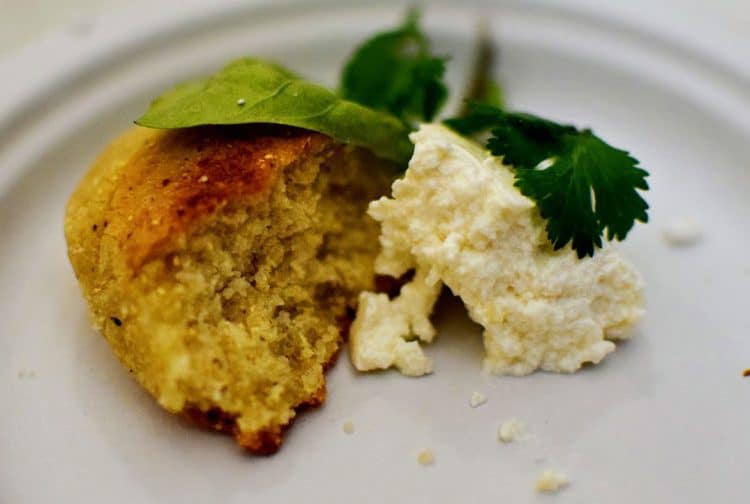
Mchadi: The Other Georgia’s Corn Bread
Mchadi (მჭადი) is a traditional Georgian cornbread. At its simplest, it is pan-fried cornmeal and water. Dense, slightly crisp on the outside, and crumbly inside, mchadi is best served as an accompaniment to richly flavored dishes, especially those with sauces to sop up. The etymology of mchadi comes from the Georgian verb chadna (ჩადნა), meaning […]

Nadugi: Never Too Much (Georgian) Cheese
Dr. Michael Denner: You can tell a lot about a cuisine and culture by the way they eat their milk… That’s the point I tried to make in our latest Georgian Cooking Club meeting, waving about a gallon of milk, sheathed in its translucent plastic carapace. My students were confused at first… Georgian Milk Milk. […]
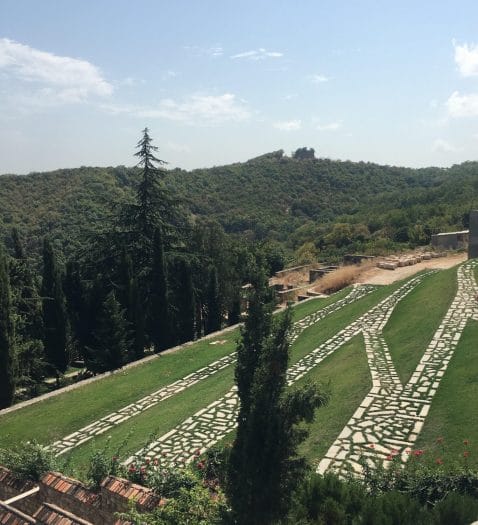
The Monastery of Saint Nino at Bodbe in Georgia
During my first week in Georgia, my classmates and I took a trip out to Sighnaghi, which is roughly a two-hour drive from Tbilisi, the Georgian capital. In Sighnaghi, we visited the Monastery of Saint Nino at Bodbe, which was built in the 9th century and renovated extensively in the 17th century. Saint Nino, who […]
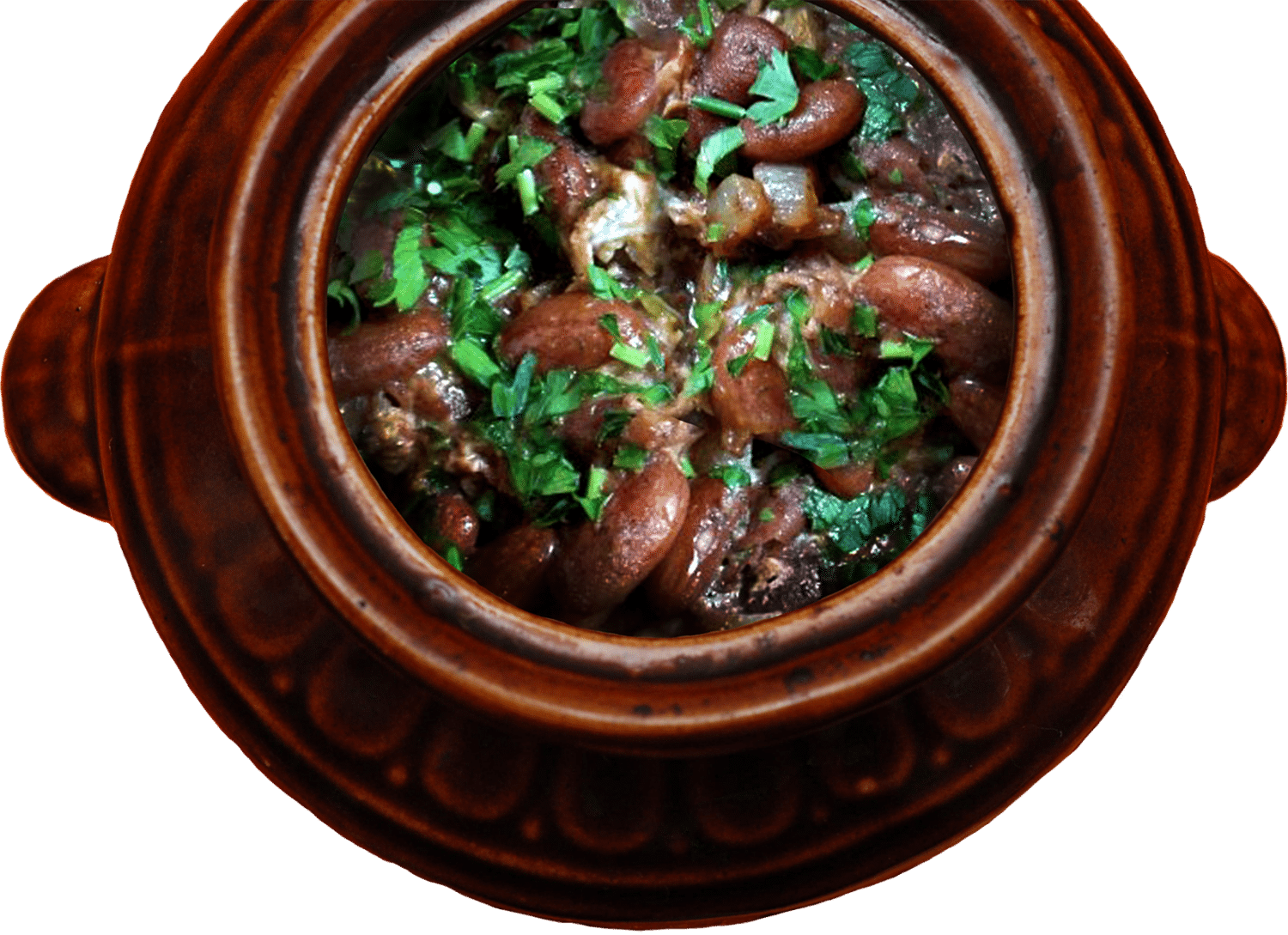
Lobio with Vinegar (Georgian Red Bean Salad)
The following is an excerpt from “Лобио, сациви, хачапури, или Грузия со вкусом“ (Lobio, Satsivi, Khatchapuri, or Georgia with Taste) by Tinatin Mzhavanadze, a best-selling cookbook author in Georgia. It has been translated and adapted by Dr. Michael Denner of Stetson University in Florida. History and Preparation of Lobio Dr. Michael Denner: Lobio (ლობიო, лобио) means […]
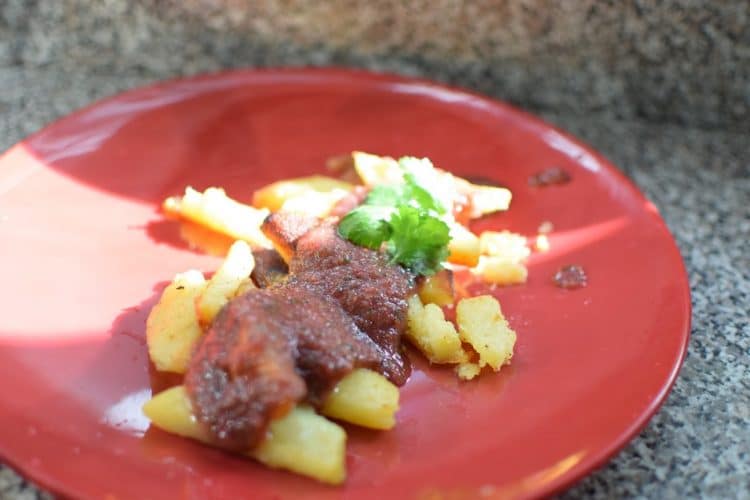
Tkemali: Georgian Sour Plum Sauce
Dr. Michael Denner (notes from the American Test Kitchen): Georgians jokingly refer to tkemali (more accurately written t’q’emali) as “Georgian ketchup.” It gets poured on practically everything. I don’t know of another sauce like it: sour, fruity, salty, with a serious herbal punch and a bit of lingering heat. Maybe it looks like Mexican salsa […]

